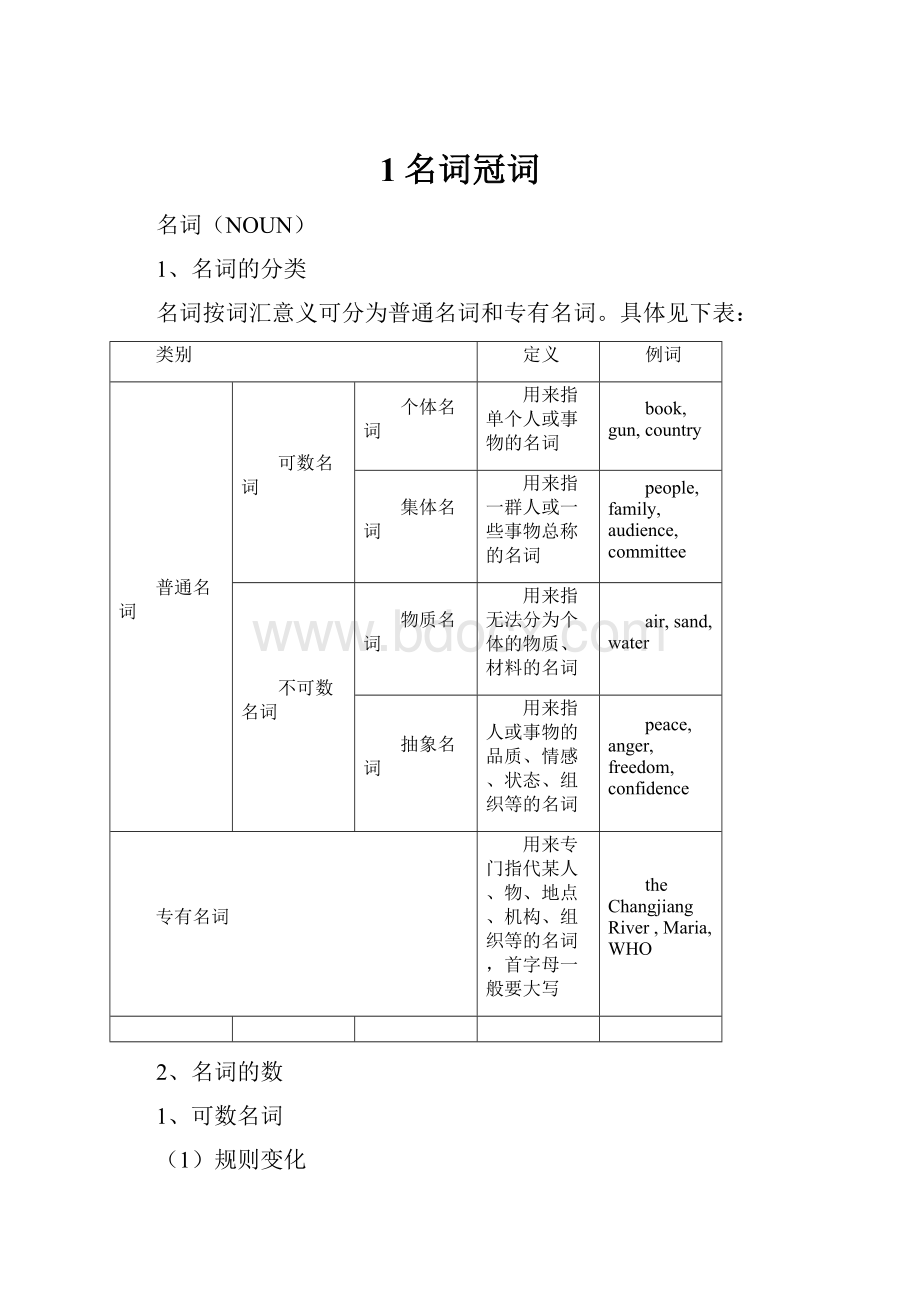1名词冠词.docx
《1名词冠词.docx》由会员分享,可在线阅读,更多相关《1名词冠词.docx(23页珍藏版)》请在冰豆网上搜索。

1名词冠词
名词(NOUN)
1、名词的分类
名词按词汇意义可分为普通名词和专有名词。
具体见下表:
类别
定义
例词
普通名词
可数名词
个体名词
用来指单个人或事物的名词
book,gun,country
集体名词
用来指一群人或一些事物总称的名词
people,family,audience,committee
不可数名词
物质名词
用来指无法分为个体的物质、材料的名词
air,sand,water
抽象名词
用来指人或事物的品质、情感、状态、组织等的名词
peace,anger,freedom,confidence
专有名词
用来专门指代某人、物、地点、机构、组织等的名词,首字母一般要大写
theChangjiangRiver,Maria,WHO
2、名词的数
1、可数名词
(1)规则变化
构成方法
例词
一般在词尾加-s
desk→desks,map→maps
bridge→bridges,horse→horses
以-s,-x,-sh,-ch结尾的加-es
glass→glasses,brush→brushes,
watch→watches,box→boxes
【但是】stomach的复数形式是___________
以-o结尾加-es的4个词
黑人______________,英雄_______________
西红柿____________,土豆_______________
以-o结尾加-s(表示无生命的词)
piano→pianos,photo→photos
zoo→zoos,radio→radios
以-y结尾的词
辅音字母加-y,变y为i加-es
元音字母加-y,直接加-s
factory→factories
toy→toys,monkey→monkeys
boy→boys,way→ways
以-f或-fe结尾的词,将-f或-fe改为v,再加-es
wolf→wolves,wife→wives
【但是】以下8个以-f或-fe结尾的词直接在词尾加-s即可:
海湾________,屋顶______,
悬崖_____,首领_______,奴仆______,
信仰_______,证据______,手帕___________
【同时】还有几个词有两种变化方式,它们是:
handkerchief,hoof,scarf,
zero,mosquito,tobacco,cargo,volcano
(2)不规则变化
构成方法
例词
改变单数名词内部的字母
foot→feet,tooth→teeth,goose→geese
man→men,woman→women,mouse→mice
louse→lice(直接加-s,louses意为________)
词尾加-en或-ren
ox→oxen,child→children
单复数同形
sheep,deer,fish,means,works,head(表示动物的头数),aircraft,species,Chinese,Japanese,Swiss
独特的变化方式
analysis→analyses,basis→bases,crisis→crises,oasis→oases
thesis→theses,phenomenon→phenomena,formula→formulae
criterion→criteria,bacterium→bacteria,medium→media
datum→data
直接从汉语音译,要用斜体
tenli,100mu,thirtyjin
(3)只有复数形式的名词
构成方法
例词
名词所表示的物体本身是由两个部分构成
scissors,trousers,shorts,socks,gloves,shoes,scales,compasses
glasses,handcuffs,earphones
以-ings结尾的名词
savings,findings,earnings,surroundings,winnings,doings
belongings,writings,greetings
意思不同于其单数形式的名词
clothes,woods,goods,riches,sweets,customs,remains,powers
brains,stairs,damages,plastics,nobles
(4)复合名词的复数形式
构成方法
例词
一般将主体名词变为复数
passer-by____________,new-comer______________
father-in-law____________,runner-up_____________
comrade-in-arms_________________
没有主体词,在词尾加-s
go-between______________,grown-up_____________
forget-me-not______________,look-out____________
good-for-nothing_________________
以man和woman为词尾,按man和woman的复数形式变化
Frenchman_______________,gentleman___________
Englishwoman______________,craftsman__________
man,woman和lord置于前面构成复合名词时,前后两个名词同时变为复数
manservant______________
womandoctor________________
Lordmayor________________
(5)以下习惯搭配中名词用复数
tensofthousandsoftaketurnsbefriendswith
takestepsbeinhighspiritstakenotes
beinone'stwenties/fiftiestakepains
makepreparationsfordomorningexercises
keeptieswithmakerepairsinrags
makebothendsmeetindozensinruins
hurtone'sfeelingsburstintotearseatone'swords
haveone'swordswithcallone'snamesexchangeone'sideas
givemybestwishes/regardstosb.
2、不可数名词
(1)有些抽象名词可用复数形式,表示“具体的食物”或“数量多”
hope希望→hopes(各种)希望difficulty困难→difficulties(种种)困难
hardship艰难→hardships艰难困苦interest兴趣→interests(多种)兴趣
例:
Ihadgreatdifficulty(in)solvingtheproblem.
Hefacedmanydifficulties.
(2)有些个体名词可以转化为抽象名词
aboat→comebyboatayouth→youthaplane→gobyplane
aschool→gotoschoolaroom→muchroomabed→gotobed
awonder→fullofwonder
(3)有些物质名词可用复数形式,表示类别或数量
fish→fishessteel→steelstea→teas
coffee→coffeesfood→foodsfruit→fruits
例:
Whichdoyoulikebetter,teaorcoffee?
Theoldshouldtakesomehealthyfoods.
Twocoffees,please.Wecan'tlivewithoutfood.
(4)有些不可数名词用复数形式表示不同的含义
iron铁→irons_____cloth布料→clothes_______
ash灰→ashes______custom习惯→customs_______
water水→waters_______glass玻璃→glasses_______
sand沙子→sands______green绿色→greens_______
manner态度→manners________work工作→works___________
paper纸→papers_____________matter物质→matters__________
force力量→forces________content内容→contents_________
例:
CanIhaveasheetofpaper?
Pleasecolorthepicturegreen.
Howmanypapersdoyoutake?
Greensaregoodforourhealthy.
(5)高考热点~!
以下这些词是无论什么情况下都是不可数且又被经常考查的部分抽象名词和物质名词
advicefunprogresswealthhousework
informationweatherhomeworkpracticeproduction
permissionairbaggagechangecloth
equipmentmoneytrafficmusicwaste
luggagenewshealthfurniture
抽象名词本身不可数,但有些表示具体事物时,可转化为可数,能与a/an连用
令人感到荣耀的人或事______________令人感到高兴的人或事_______________
成功的人或事_______________失败的人或事________________
令人感到惊讶的人或事________________奇观,奇事__________
一次经历________________一件麻烦的事_______________
例:
Theystoodinsilenceasamarkofhonortoher.
Itwasagreathonortobeinvitedheretoday.
—Wouldyoupleaselendmeyourcar?
—Withpleasure
Whatapleasureitistomeetyouhereagain!
Confidenceisthekeytosuccess.
Inmyopinion,heisasuccessasasinger,butafailureasanactor.
Hegaspedwithsurpriseatherstrength.
Here-mailcameasacompletesurprise.
(6)某些不可数名词前用形容词修饰时,可以和a/an修饰
arichdinneragoodeducation
adeeplovetakeanactivepartin
aheavyrainalongsilence
haveagoodtime
3、名词的格
1、所有格的构成
Mark'spenChina'spopulationtheboss'order
twohours'walkmen'sroomhisson-in-law'scar
myfatherandmother'sfriends
TomandHenry'sroomfacesnorth
atthebarber'satthetailor'satthebutcher's
atthedoctor'sgotoTom'sattheGreen's
2、名词双重所有格
of+名词's的结构叫做名词双重所有格
(1)双重所有格的含义
双重所有格表示部分概念,而of所有格只表示所属关系
afriendofhermother's
afriendofhermother
apictureofhisbrother's
apictureofhisbrother
(2)应注意的问题
of前面的名词一定要有a/an,two,any,some,several,few,another,no或this,that,these,those之类的修饰语
IliketoreadanovelofLuXun's.
Twoclassmatesofmysister'swillcometojoinus.
Doyouknowanyfriendofmyfather's?
ThatisnofaultofJohn's.
ThatcarofPeter'sisalwaysbreakingdown.
of后面的词必须是指人的词
thehouseofMrSmith's
4、名词的作用
名词可以作主语、表语、宾语、补足语、定语、同位语、状语
常考点是作定语~!
名词可以用来修饰另一个名词,表示材料、类别、用途等。
名词作定语时常使用单数形式
如:
apaperbasketaneveningpaperstreetlamps
ashoefactoryatelephonedirectoryacoffeecup
villagepeopleafilmstarheartattack
【注意】下列名词作定语时需要用复数形式
asportscarsalesdepartmentarmsproduction
5、例题
1.Ihaven’tseenSarasinceshewasalittlegirl,andshehaschangedbeyond_______
A.hearingB.strengthC.recognitionD.measure
2.Lastyearthenumberofstudentswhograduatedwithadrivinglicensereached200,000,a(n)______of40,000peryear.
A.averageB.numberC.amountD.quantity
3.Thosewhosufferfromheadachewillfindtheyget______fromthismedicine.
A.reliefB.safetyC.defenseD.shelter
4.Jamestookthemagazinesoffthelittletabletomakeforthetelevision.
A.roomB.areaC.fieldD.position
5.Thedoctorisskilledattreatinghearttroubleandneveracceptsanygiftfromhispatients,sohehasaverygood_____.
A.expectationB.reputationC.contributionD.civilization
6.Thisrestauranthasbecomepopularforitswideoffoodsthatsuitalltastesand
pockets.
A.divisionB.areaC.rangeD.circle
7.Aftertheearthquake,thefirstthingthelocalgovernmentdidwastoprovideforthehomelessfamilies
A.accommodationB.occupationC.equipmentD.furniture.
8.Theschooladvisershelpyoutalkthroughyourproblembuttheydon’tgiveyouanydirect______.
A.solutionB.targetC.measureD.function
9.The
policeareofferinga__________
toanyonewhocangiveinformationaboutthelostkey.
A.priceB.prizeC.rewardD.money
10.Ikeepmedicinesonthetopshelf,outofthechildren’s.
A.reachB.handC.holdD.Place
11.Ican’tsaywhichwineisthebest–it’sa(n)ofpersonaltaste.
A.affairB.eventC.matterD.Variety
12.I’mtryingtobreakthe_______ofgettinguptoolate.
A.traditionB.convenienceC.habitD.Leisure
冠词(ARTICLE)
一、冠词的种类:
定冠词和不定冠词
1.不定冠词
a和an两种形式。
2.定冠词
只有the一种形式
(注)不定冠词泛指某一类人或事物中的任何一个,相当于汉语的“一个”,但不强调数目观念。
the用在单数或复数名词前,特指某一个人或某一些人或事物,相当于汉语的“这”,“那”,“那些”。
二、冠词的用法:
(一)不定冠词的用法
1.表示种类,指人或事物的某一种类
Heisastudent.
Hewantstobeadoctor.
2.表示同一类人或事物中的任何一个,相当于any。
Asquarehasfoursides.
3.表示“一”这个数量
Romewasnotbuiltinaday.
Theywillbebackinadayortwo.
4.表示“同一”这个概念,相当于thesame
Thetwoflowerslookdifferent,buttheyareofakind.
5.表示“某一个”,用于初次提到一个人或物,或者说话者认为没有必要或不想具体说明是哪一个时
Thereisapolicemanonthestreetcorner.
AMissJaneiswaitingforyou.
(二)定冠词的用法
1.特指人或事物
I'veboughtawatch.Thewatchcostme$50.
2.在单数可数名词前表示一类人或事物
Thepostmanemptiestheletterboxesanddeliverstheletters.
3.使形容词或分词名词化,表示一类人或事物
Tohealthewoundedandtosavethedyingisourduty.
4.在复数名词或集体名词前强调一类人或事物的全体
TheGradeTwoteachersarehavingameeting.
5.与某些表示国籍,地域,民族的形容词连用,表示整体概念,作主语时,谓语要用复数
theEnglishtheSpanishtheFrenchtheDutchtheRussian
MostoftheBritisharesomewhatconservative.
6.表示世界上独一无二的东西
Thesunisshiningbrightly.
7.用于序数词或形容词最高级前,以及对两个人或物进行比较时起特定作用的比较级前
Hewasthefirsttospeakagainstslavery.
(注意)second,third等序数词前可出现不定冠词,表示再……,又……
Thebookisveryinteresting.Iwanttohaveasecondlook.
8.表示阶级,党派名词前
MybrotherjoinedthePartylastyear.
9.用在西洋乐器名词前,中国民族乐器名词前不用冠词
Shecanplaythepiano/thesaxophone/theelectronicorgan/Erhu
10.用在姓氏复数形式前,指一家人
TheGreensarehavingbreakfast.
11.表示计量单位的名词前
Pencilsaresoldbythedozen.
Irentedthehousebythemonth.
(注意)by后的名词若为不可数名词,则不加冠词
Applesaresoldbyweight/jin.
12.在句型v+人+介词+the+人体部位
takesbbythearmpatsbontheshoulderstrikesbintheface
seizesbbythesleeveleadsbbythehand
三、专有名词前的冠词
1.不定冠词用于专有名词前
所指的人或事物与专有名词有类似的性质
IwishtobeanEdison.
2.定冠词用于专有名词前
(1)专有名词可转化为普通名词用,表示别的人或物具有名词之特性
HeistheNewtonoftheage.
(2)限定用法的专有名词
TheEuropeofthe18thcenturywasdifferentfromthatofthe20thcentury.
(3)有性质形容词修饰的人名前
theambi